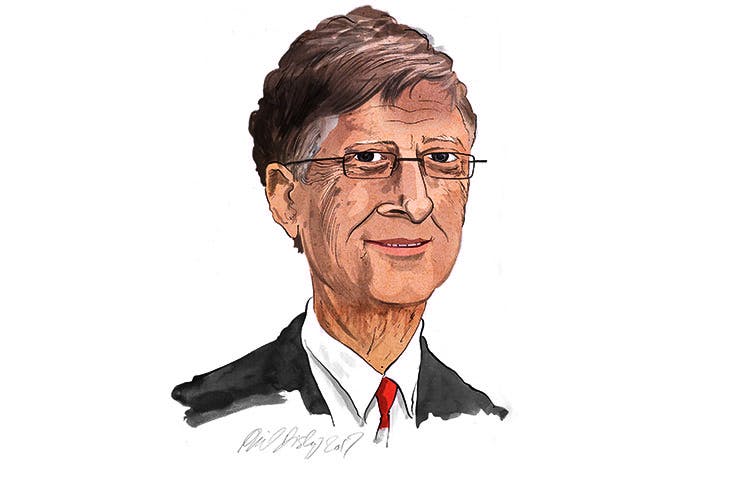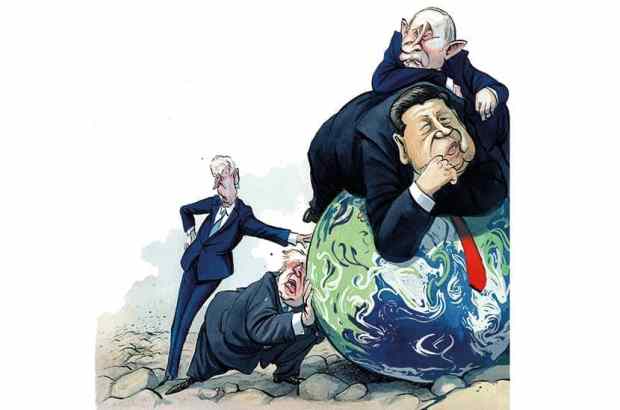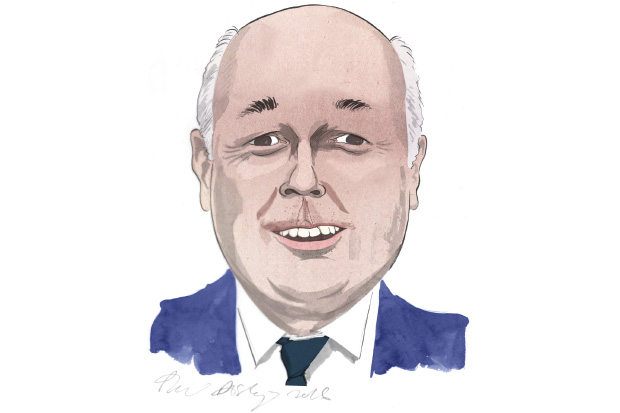Bill Gates is worried about Britain. For years, the UK government has been one of the world’s largest donors in overseas aid, and about £60 million has been given to the Bill & Melinda Gates Foundation. But aid has been rather unpopular lately, prompting questions about whether a generous country like Britain needs charitable donations collected by the taxman. And indeed, whether the aid spending pledge might be dropped in the general election campaign. Mr Gates senses a different tone of debate in Washington and London, with too few people making the case for government aid. So the world’s richest man is stepping in.
He was in Britain last week to confront various arguments against aid — starting with the idea that global capitalism is now doing the job, with poverty falling at the fastest rate in history. With western governments mired in debt, is it safe to let global trade take over? Even over the phone, his irritation is audible.
‘Take polio eradication,’ he says. ‘There’s no notion of globalisation dramatically stopping kids from being paralysed. There’s no market that deals with that. Without the generosity of governments and philanthropy, there’s no creation of the vaccines that are saving those kids’ lives. I’m a huge fan of capitalism and trade. But who will create the stable conditions for countries to become self-sufficient, particularly in Africa, given its disease burden? It won’t happen through some market mechanism.’ To suggest otherwise, he says, is not just mistaken, but callous. ‘If you care at all about conditions in Africa — the population explosion, measles, polio — then don’t suggest there is some private sector solution to those problems. It’s outrageous.’
He is a famously successful capitalist (worth $86 billion) who has set up the world’s largest charity (with a $40 billion endowment) which prides itself on using private sector rigour. It’s a formula that persuaded Warren Buffett to pledge $30 billion, which Mr Gates hailed as the most ‘anyone ever gave anybody for anything’. But philanthropy accounts for less than 5 per cent of international aid, he says, so if governments don’t keep spending, no one will fill the gap.
‘In the case of the UK government, aid is under 2 per cent of the budget — it’s 0.7 per cent of GDP, and applied in places where the interventions are at least a hundred times more effective than anything you’d do domestically. If you can’t save a life for less than $1,000, it’s not done. Nor is it done unless there’s a strategic goal — in terms of reducing pandemics, or creating stability to avoid war and migration. So you’re getting something back, avoiding problems for the UK and in particular the US. It would cost money to have a pandemic come out of Africa, it would cost money to have mass migration.’
This is his other argument for foreign aid: that it’s not altruistic, that it helps stave off problems at home. But isn’t it a stretch to say that British aid can be justified because it prevents pandemics from hitting our shores — surely the extraordinary response to the Ebola virus was about saving African lives?
‘Well, if people aren’t worried about pandemics coming to Britain then they should be,’ he says. ‘Diseases will come out of Africa that transmit far more effectively than Ebola, so these countries need to have basic health systems to contain whatever new pathogens come along. That is important in terms of security. If you asked what in the world is most likely to jump out and kill an extra ten million people, it is absolutely a pandemic. The kind of surveillance and ability to respond that we have through our aid budgets means that we ought to be able to stop these diseases before they spread back to the UK or the US.’
I put to him that, on migration, he has the relationship the wrong way around — that higher migration is correlated with lower poverty. Only when countries start to develop do people acquire the resources to make expensive migration journeys. The Washington–based Center for Global Development recently set this out, in a study drawing on more than a thousand national censuses over five decades. When a poor country becomes richer, its emigration rate rises — until it becomes about as wealthy as Albania is today. This process usually takes decades, and only afterwards does wealth subdue emigration. So isn’t it incorrect to argue (as even Theresa May once did) that more aid means less migration?
‘I don’t know how many refugee camps you’ve been to recently. Those aren’t rich people,’ he says. ‘In the case of Syria, 90 per cent of the refugees are in Jordan and Lebanon and that’s why there is this huge rift. You are going to have a governmental collapse there — if that happens, it would cascade and create even more pressure for spending money in the region. But if you had avoided the problem you would have been better off.’
Isn’t that a question of conflict resolution, rather than overseas aid? ‘Oh absolutely. But as countries get better off, the chances of civil war go down dramatically. People don’t sit around wondering if there is going to be tribal warfare in Brazil. That’s more typical in a situation like Libya, Mali or Sudan: you get a problem because you haven’t uplifted the lives there and created that stability.’
Over the years, Mr Gates has tended to be one of the more optimistic characters in the world of aid, striking a different tone from the often doom-laden messages of fundraising charities. He once predicted that there will be almost no poor countries left in the world by 2035. He is more cheerful, he says, because of his hands-on experience. ‘I get a chance to actually see the impact of aid: uplifting countries, creating stability and preventing pandemics.
And in a significant percentage of that aid we’re in partnership with the British government,’ he says. If more people in Britain saw this, he adds, ‘they’d be proud to be involved in it’.
Got something to add? Join the discussion and comment below.
Get 10 issues for just $10
Subscribe to The Spectator Australia today for the next 10 magazine issues, plus full online access, for just $10.
You might disagree with half of it, but you’ll enjoy reading all of it. Try your first month for free, then just $2 a week for the remainder of your first year.















Comments
Don't miss out
Join the conversation with other Spectator Australia readers. Subscribe to leave a comment.
SUBSCRIBEAlready a subscriber? Log in